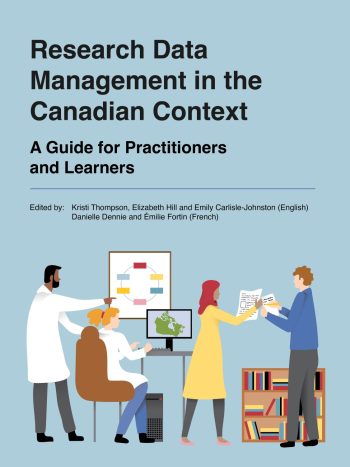
“Research data are data that are used as primary sources to support technical or scientific enquiry, research, scholarship, or creative practice, and that are used as evidence in the research process and/or are commonly accepted in the research community as necessary to validate research findings and results. Research data may be experimental data, observational data, operational data, third party data, public sector data, monitoring data, processed data, or repurposed data. What is considered relevant research data is often highly contextual, and determining what counts as such should be guided by disciplinary norms.”– Frequently Asked Questions Tri-Agency Research Data Management Policy



Images by Keimi Nakashima-Ochoa, CC BY-NC-SA
Research Data Management involves processes and tools that researchers use to create and save the data they generate over the course of their research. Data may be in various forms including text, transcripts, recordings and numeric data. There are a number of tools that can be used to help organize, format, document, store, protect and preserve your data that will help to save time, increase efficiency, meet grant requirements, improve accessibility and secure your research data. For more information explore the content below and read the Tri-Agency Research Data Management Policy.
The Digital Research Alliance of Canada (formally Portage) "is a national, library-based research data management network" that provides guidance on how to manage research data. Create an account to access the Data Management Plan (DMP) Assistant, an effective tool to help create a data management plan that meets the requirements of the Tri-Agency Funders. Although ECUAD is not one of the partnering institutions, individuals can still sign up and access the DMP Assistant.
A free online course on digital data management.

During the 2020/21 academic year, Emily Carr University hosted the series, Digital + Creative Knowledge Sharing: Data Management in Creative Research. Events covered topics such as data refusal, data care, data collections/collectivism, and data cultures.
Event recordings can be found in eCollections at Emily Carr.
This series was supported by Social Sciences and Humanities Research Council of Canada (Research Data Management Capacity Initiative), Emily Carr University Research + Industry Office, VP Academic and Provost Office, Emily Carr Library and First Nations Information Governance Centre.
This talk was recorded on November 9, 2021 by Chris Landry (Ontario College of Art and Design). It includes an introduction to research data management (RDM) in the context of the Open Access Movement and federal policy, data planning and principles, data storage, and data deposit. The content is also available here: https://ocadu.libguides.com/data.
This presentation was a part of Conducting Creative Research, a collaborative series between Emily Carr University of Art and Design (ECU) and OCAD University (OCAD U). The series explores themes around responsible conduct in art and design research.
The Conducting Creative Research events were made possible with a SRCR Education and Training Support (SETS) Grant from the Secretariat on Responsible Conduct of Research through the Panel on Research Ethics (PRE) and the Panel on Responsible Conduct (PRCR) of Research on behalf of the three federal research granting agencies: The Canadian Institutes of Health Research (CIHR), the Natural Science and Engineering Research Council of Canada (NSERC), and the Social Sciences and Humanities Research Council of Canada (SSHRC).
library@ecuad.ca
604-844-3840
520 East 1st Avenue, Vancouver, BC